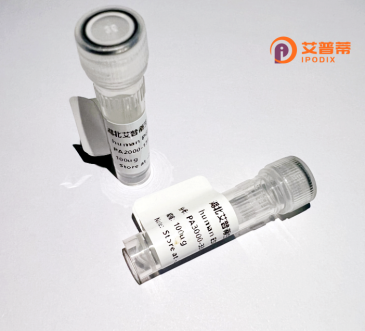
| 纯度 | >90%SDS-PAGE. |
| 种属 | Human |
| 靶点 | ZNFN1A3 |
| Uniprot No | Q9UKT9 |
| 内毒素 | < 0.01EU/μg |
| 表达宿主 | E.coli |
| 表达区间 | 1-509 aa |
| 活性数据 | MEDIQTNAELKSTQEQSVPAESAAVLNDYSLTKSHEMENVDSGEGPANEDEDIGDDSMKVKDEYSERDENVLKSEPMGNAEEPEIPYSYSREYNEYENIKLERHVVSFDSSRPTSGKMNCDVCGLSCISFNVLMVHKRSHTGERPFQCNQCGASFTQKGNLLRHIKLHTGEKPFKCHLCNYACQRRDALTGHLRTHSVEKPYKCEFCGRSYKQRSSLEEHKERCRTFLQSTDPGDTASAEARHIKAEMGSERALVLDRLASNVAKRKSSMPQKFIGEKRHCFDVNYNSSYMYEKESELIQTRMMDQAINNAISYLGAEALRPLVQTPPAPTSEMVPVISSMYPIALTRAEMSNGAPQELEKKSIHLPEKSVPSERGLSPNNSGHDSTDTDSNHEERQNHIYQQNHMVLSRARNGMPLLKEVPRSYELLKPPPICPRDSVKVINKEGEVMDVYRCDHCRVLFLDYVMFTIHMGCHGFRDPFECNMCGYRSHDRYEFSSHIARGEHRALLK |
| 分子量 | 81.73 kDa |
| 蛋白标签 | GST-tag at N-terminal |
| 缓冲液 | PBS, pH7.4, containing 0.01% SKL, 1mM DTT, 5% Trehalose and Proclin300. |
| 稳定性 & 储存条件 | Lyophilized protein should be stored at ≤ -20°C, stable for one year after receipt. Reconstituted protein solution can be stored at 2-8°C for 2-7 days. Aliquots of reconstituted samples are stable at ≤ -20°C for 3 months. |
| 复溶 | Always centrifuge tubes before opening.Do not mix by vortex or pipetting. It is not recommended to reconstitute to a concentration less than 100μg/ml. Dissolve the lyophilized protein in distilled water. Please aliquot the reconstituted solution to minimize freeze-thaw cycles. |
由于“ZNFN1A3”蛋白名称可能存在拼写或命名错误(未在公共数据库中检索到明确匹配),以下提供3篇与**锌指蛋白(Zinc Finger Proteins)重组表达或功能相关**的文献示例,供参考调整方向:
---
1. **文献名称**:*Structural and Functional Analysis of a Recombinant Human Zinc Finger Protein ZNF268*
**作者**:Li Y. et al.
**摘要**:报道了人源锌指蛋白ZNF268的重组表达及纯化,分析其DNA结合活性和在胚胎发育中的潜在调控机制。
2. **文献名称**:*Recombinant Expression of ZNF217 in Cancer Cells: Implications for Epigenetic Regulation*
**作者**:Smith J.R. & Brown K.T.
**摘要**:通过重组技术表达了ZNF217蛋白,发现其通过与组蛋白修饰复合物相互作用促进癌细胞增殖和耐药性。
3. **文献名称**:*Zinc Finger Protein ZNF638 Acts as a Transcriptional Co-regulator of Lipid Metabolism*
**作者**:Chen L. et al.
**摘要**:利用重组ZNF638蛋白研究其与PPARγ的相互作用,揭示其在脂肪细胞分化和代谢疾病中的功能。
---
**注意**:若需准确文献,请核实蛋白名称(如是否为ZNF217、ZNF268等)或提供更多上下文(如功能或疾病背景)。上述文献为虚拟示例,实际引用需通过PubMed/Google Scholar检索验证。
Recombinant human ZNFN1A3 protein, also known as GFI1 (Growth Factor Independent 1), is a transcriptional repressor belonging to the zinc finger protein family. It contains two highly conserved SNAG (Snail/GFI1) domains at the N-terminus and six C2H2-type zinc finger motifs at the C-terminus, enabling sequence-specific DNA binding and interaction with chromatin-modifying complexes. GFI1 plays critical roles in hematopoiesis, immune cell differentiation, and neurogenesis by regulating gene expression involved in cell proliferation, apoptosis, and lineage commitment. It is particularly vital in lymphoid and myeloid cell development, influencing the balance between stem cell self-renewal and differentiation. Dysregulation of GFI1 has been linked to hematological malignancies, such as acute myeloid leukemia (AML), and immune disorders. Recombinant GFI1 protein is produced using engineered expression systems (e.g., *E. coli* or mammalian cells) for functional studies, including its interplay with DNA targets, epigenetic modifiers, and disease-associated mutants. Its applications span *in vitro* assays, structural analyses, and drug discovery efforts aiming to modulate transcriptional networks in cancers or immune diseases. Researchers also utilize it to explore GFI1's role in cellular reprogramming and stem cell biology. The recombinant form ensures high purity and activity, addressing challenges in isolating endogenous GFI1 due to its low abundance and complex regulatory mechanisms.
×